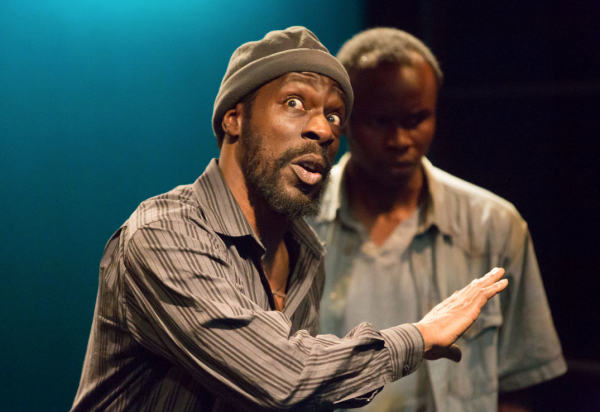The Rise and Shine of Comrade Fiasco (Gate Theatre)
Andrew Whaley’s 1990 Zimbabwe-set drama gets ‘tangled in its own symbolism’

© Michael Shelford
As it should be, perhaps. The Gate's new Burning Freedom season, examining the aftermath of revolution, is another sharp and pertinent piece of programming from artistic director Christopher Haydon. Unfortunately, its opener, Andrew Whaley's 1990 play gets tangled in its own symbolism. It makes its point, that what was fought for is all too easily forgotten, but loses its way as drama – despite a handsome, boisterous production from Elayce Ismail, winner of this year's JP Morgan award for emerging designers.
Whaley takes us to a prison cell, seven years after the war of liberation that turned colonial Rhodesia into Zimbabwe, where three prisoners have been locked up after a drunken brawl. Still they squabble, though, bickering over the bucket that serves as their latrine.
In the corner, they see a fourth: a bundle of rags, wild-eyed, dishevelled and unspeaking. There's something tribal about him, primitive even. This is Comrade Fiasco, a freedom fighter who has spent the last eight years living in a cave in the hills, unaware that his war has been won. "You are lucky," one of the prisoners explains. "You missed the labour queues, the waiting and the disappointment."
'Whaley's play gets lost in its own layers'
Fiasco, who may or may not exist, is a symbol of Zimbabwean identity. The country he finds on his descent has simply replicated the hierarchies and power structures that existed under colonial rule of its own accord. Its people have absorbed Western ideals. They talk of Hollywood icons and space satellites.
However, Whaley's play gets lost in its own layers. As the prisoners enact the narrative of Fiasco's hermitage and rediscovery, their concrete circumstances and their fable become confused, until symbolism overrides the situation. It builds to a bizarre rebirth that makes sense as metaphor, but not as dramatic action and the play become an increasingly perplexing watch. Whaley's overall purpose registers, but the subtleties get lost in translation, not least as the lyrical language takes flight.
Is that the production's fault? Partly. Ismail keeps things engaging, but offers little elucidation, while Rosanna Vize's sculptural design – a metal climbing-frame cell surrounded by rocky hills – helps the actors more than it does the audience. The storytelling-in-situ feels dated and, for all the cast bounce around energetically, they struggle to balance individual characterisation with their roles as narrators. Gary Beadle provides some comic thrust as the rambunctious old-timer Jungle, while Kurt Egyiawan is sinewy and bitter as Chidhina. Abdul Salis makes a muscular, upright Fiasco – arguably too close to noble savage stock – but, even so, it's hard to care about so obvious a symbol.
The Rise and Shine of Comrade Fiasco runs at the Gate Theatre until 21 March












